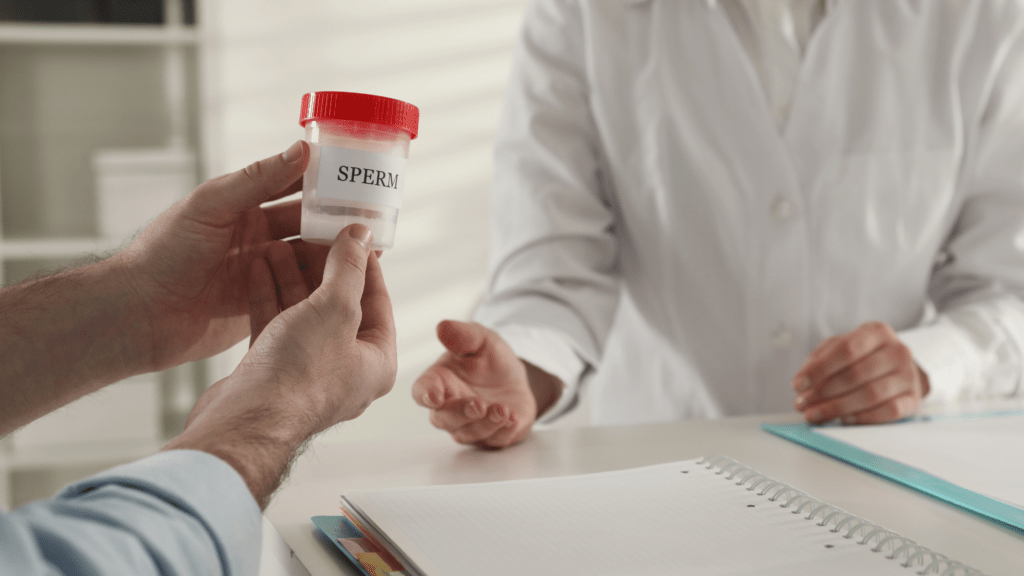The Ultimate Guide to Male Fertility

Starting or growing your family is a wonderful time, and being a parent is a life-changing experience. You might not have had to think much about your fertility before, but now that you are looking to conceive, The IVF Network has created this guide to answer all your questions and give you the best chance of conceiving.
What is male fertility?
Infertility refers to the ability to get pregnant after one year of trying to conceive. It may seem obvious, but you need to be having regular unprotected sex for your partner to become pregnant. Regular sex is considered to be two to three times a week.
Male factor fertility refers too sperm health and the sperm’s ability to fertilise an egg. It is primarily linked to sperm production and transportation. Healthy sperm are necessary to fertilise the egg and create an embryo.
Watch now: Jonathan Ramsay, Male Fertility Specialist shares his expertise and advice on male fertility.
How to boost male fertility
There are many lifestyle factors that you can adjust to improve your fertility. Male factor fertility can be impacted by your diet, the amount of sleep you get, your stress levels, and your weight.
Fertility diet
Fertility Nutritionist and IVFN Advisor Mel Brown advises starting a fertility diet in the months before and during the time you are hoping to conceive. Eating a balanced diet with antioxidant-rich foods, such as fruits, vegetables, and fortified foods, has been shown to improve sperm health. Adding walnuts to your diet is another food that is often suggested for male fertility. It can support the creation of healthier sperm because the nutrients they contain may be linked to sperm health.
Some research shows that when taking supplements, such as vitamin C zinc and folic acid, men saw improved fertility and an increased sperm count.

Weight and exercise
Healthy lifestyle practices (such as exercising regularly, maintaining a healthy weight, or aiming for a healthy body mass index) can help improve sperm health. Exercising for 20-30 minutes three times a week can contribute to a boost in sperm health.
On the other side of this, having an unhealthy body mass index and a sedentary lifestyle can hamper sperm production and decrease sexual function, therefore increasing your chances of fertility problems.
Health and wellbeing
Wellbeing is more than doing yoga and having a positive outlook on life. It is about ensuring you are taking care of your body and mind and being well in all aspects of your life and as part of your routine.
Stress
It is one of the tribulations of modern life that most people experience stress. Whether this is through work, relationships or finances, stress can negatively impact fertility. Like a catch twenty-two, if you are beginning to worry about having fertility issues, this can add to the stress you experience.
Moreover, stress can impact the relationship you have with your partner and your willingness to have regular sex.
Sleep
Another part of life that might feel like it is hard to control is sleep, yet getting enough sleep has an impact on fertility. Getting less sleep than recommended can result in a lower sperm count.
Sexually transmitted infections
Sexually transmitted infections can cause complications and harm you and your partner’s reproductive health and affect both of your future fertility chances. If you think you have an STI, visit your health clinic.
Drugs and alcohol
Check how many prescription medicines you are taking, as they may affect your fertility. Some medicines can impact your fertility and lower your sperm count. So, if you and your partner are looking to start your family, discuss the medication you are taking with your healthcare professional.
Reducing your alcohol intake can positively affect sperm quality and reduce the likelihood of experiencing other reproductive health issues, such as erectile dysfunction. If you are looking to improve your fertility, then reducing your alcohol intake may help.
Smoking can have an adverse effect on semen quality, so it is advised to quit smoking. Smoking can also be also linked to erectile dysfunction, so quitting smoking can improve male fertility. Don’t smoke cigarettes around your partner or in the home if your partner is pregnant. Passive smoking can cause a number of problems with the developing foetus smoke might be more likely to cause miscarriages.
Studies show that recreational drugs, such as anabolic steroids or cannabis, have an impact on male fertility conditions and sperm health. When trying to get pregnant it is advised to stop and seek help. If you are struggling with drugs and addiction, get help by contacting FRANK.
Environmental factors
Certain chemicals, such as insecticides and solvents, have been shown to affect fertility. These chemicals often are damaging especially through prolonged exposure, which is usually through an occupational hazard.
Temperature
Working somewhere hot can also raise the temperature. The optimum temperature for sperm is just below body temperature. Other things that can increase the temperature include hot baths, saunas and laptops being placed directly on your lap. Sitting or cycling for a long time can also increase testicle temperature although there is limited evidence to support this theory.
An increase in scrotal temperature can reduce sperm production. It is advised to wear loose-fitting underwear and avoid increasing the temperature around your testicles when trying to conceive.

What is male infertility?
Infertility affects 1 in 7 couples trying to get pregnant. When trying to get pregnant, a female partner usually undergoes fertility tests first, these can be invasive and stressful. However, in a couple, it is equally as likely to be the male experiencing infertility as it is the female. With male fertility problems accounting for around 50% of infertility cases. The rest is linked to female infertility, and either unexplained infertility or fertility issues with both partners.
Infertility does not mean that you cannot conceive. Azoospermia is the term for when no sperm is produced; therefore, you will not be able to conceive. Infertile men can get pregnant naturally; however, due to fertility problems, such as a low sperm count, it can take longer, or assistance may be necessary.
Watch now: How do you improve sperm quality, motility and count?
What causes male infertility?
For men, fertility issues often stem from issues with sperm. Sperm is a problem in about 40 % of infertility cases. Other issues include erectile or ejaculatory problems.
Sperm disorders
As previously mentioned, healthy sperm is necessary for conception. Some issues with sperm production include low sperm count, poor sperm motility (sperm movement), and sperm morphology (oddly shaped or not grown fully). Many things can affect sperm, such as weight, diet, medical conditions and age.
The production of antibodies to attack the sperm (immunologic infertility) can harm sperm health and reduce the healthy sperm count. Other sperm disorders include azoospermia, which is the absence of sperm in the semen. Or oligospermia, referring to low sperm counts or poor semen quality.
Producing healthy sperm is an important factor in male fertility. To tackle decreased sperm production, try to incorporate healthy lifestyle practices into your routine and visit a fertility specialist if you and your partner are concerned about fertility.
Retrograde ejaculation
Retrograde ejaculation is when the semen goes into the body rather than out of the penis. Those with retrograde ejaculation may have healthy sperm. However, the movement of the semen backwards into the body means it is not able to reach an egg for fertilisation to occur.
Those with retrograde ejaculation may have cloudy urine or less fluid when ejaculating. If you are concerned or suspect you have retrograde ejaculation, contact your healthcare professional.
Varicoceles
Varicoceles are when the veins in the scrotum are blocked. This harms sperm growth because it reduces the flow of blood, which in turn can cause a low sperm count.
Age
All parts of the male reproductive system are linked to age. As you get older, your ability to produce healthy sperm will decrease. After the age of 40, a male’s sperm production will begin to decline, affecting your chances of getting pregnant. The ability to have and maintain an erection is a key issue that some men face as they reach and exceed 40 years old. Erectile dysfunction affects 40 % of men over the age of 40.
Lifestyle factors
Having a healthy lifestyle is not guaranteed to fix fertility problems. However, as previously discussed, a balanced diet and healthy routine can improve sperm count and increase fertility.
Other lifestyle factors, such as taking medication, can affect your ability to produce healthy sperm. This medication may be necessary for disease control, such as cancer, high blood pressure or infections.
Ask your health professionals how the medication you are taking may affect your fertility.

Fertility treatment
To diagnose male infertility, you will be asked to do a semen analysis. This determines sperm health and highlights issues with sperm cells, such as sperm motility, sperm morphology and sperm count.
In addition, you will usually have a blood test to check for any sexually transmitted infections or underlying health conditions. Your fertility specialist might also do an ultrasound to view the ejaculatory ducts to see if they are blocked if they suspect there may be a sperm issue.
Your healthcare professional may also do a hormonal profile to check if the hormones needed for fertility are balanced. This will also allow them to rule out health problems, such as issues with the pituitary gland, which is linked to testosterone (the male sex hormone) and is needed to make sperm.
Surgical sperm extraction
Surgical sperm extraction is a procedure for men who may have very low sperm counts or a blockage such as a varicocele. Surgical sperm extraction is a fertility procedure, where sperm is removed from the testes. Those who have azoospermia, genetic conditions, or medical treatments, such as chemotherapy, are just some people who may be offered a sperm extraction in order to try and obtain sperm
Intracytoplasmic sperm injection
Intracytoplasmic sperm injection (ICSI) is a method of fertilisation when undergoing IVF treatment. It is when a single sperm is injected into each egg to force fertilisation to occur. The fertilised egg is then placed in an incubator for an embryo to develop and the embryo will then be transferred into the womb. Intrauterine insemination (IUI) is also an option for those with issues with retrograde ejaculation, sperm motility and low sperm counts as IUI will place the sperm into the uterus so it can travel to the egg for fertilisation to take place. IVF is also used for those with a low sperm count.
ISCI is used in cases where the male has few sperm in their semen or has abnormal sperm that cannot fertilise an egg. ICSI can also be used in cases where there has been previously failed fertilisation due to a sperm issue. If you and your partner have been trying to get pregnant and you want to learn more about your options and the fertility treatments available, contact a fertility specialist.
Fertility support
Going through fertility problems can feel lonely and stress-inducing. Whether you are looking for more information on treatments, you want to learn more about how to improve your fertility, or you want to connect with others going through a similar experience, The IVFN is here to support you.